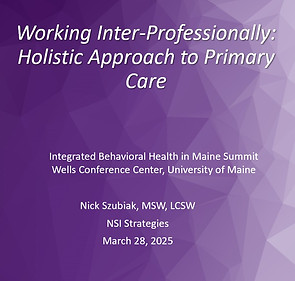Presentations and Resources
This section includes a small compilation of our favorite presentations, publications, and trainings. We also offer tailored presentations and trainings to meet the unique needs of your organization, ensuring the content is both relevant and impactful for your team.
We’re passionate about discussing the content of these sessions, aiming to deepen understanding and raise awareness about substance use disorders and mental health. If you'd like to access a full presentation or have any questions, please don’t hesitate to reach out.
Nick Szubiak, MSW, LCSW explains and identifies the discrepancies between our neurobiological understanding of addiction and current policies and approaches to care. He also describes the historical components of addiction treatment policy to question the effectiveness of current paths of care. Lastly, he discusses how stigma and discrimination is a critical dynamic that can influence and derail policy changes.
Upcoming March 28, 2025:

Working Inter-Professionally:
Holistic Approach to Primary Care
Integrated Behavioral Health in Maine Summit
This presentation focuses on the importance of working inter-professionally to provide a holistic approach to primary care. It explores the concept of integrated care, emphasizing the need for both primary and secondary prevention strategies paired with multiple providers, promoting overall health and well-being.
Presentation Resources (links provided)
Trauma, Substance Use Disorders, & Recovery: An Integrated Concept
National Council for Mental Wellbeing
This presentation provides a deep understanding of trauma and addiction, offering an overview of trauma-informed care and recovery-oriented systems of care. It explores how integrating these two models creates a more holistic approach to recovery, addressing both the psychological and physical dimensions of healing to better support individuals on their path to wellness.


Going to the MAT with Dr. Williams
National Council for Mental Wellbeing
This is an informational video series that includes MAT overview, using Methadone and Naltrexone, and pregnancy and MAT. Please view one of the episodes here. Please contact Nick for links to the full series.
Ways to Combat Opioid Epidemic
Doctors and providers put their heads together to discuss new better ways to treat opioid addiction at Wednesday's forum. WMTW News 8's Erin Dixon reports. Watch the news report here.


A Proven Method to Address Opioid Dependence Still Faces Resistance Due to Stigma, Financial Access, and Misunderstanding
Nick contributed valuable insights offering his expertise on overcoming barriers to effective opioid treatment, highlighting the challenges of stigma, financial access, and widespread misconceptions that hinder progress in addressing opioid dependence. His contributions emphasize the need for a more comprehensive, compassionate approach to treatment and recovery. Read the full article here.

Behavioral Health Brief: Medication-Assisted Treatment Needs Social Work Support
This article discusses the importance of medication-assisted treatment (MAT) in addressing opioid dependence. Despite its proven effectiveness, MAT is underutilized due to stigma and misunderstanding. It encourages social workers to integrate MAT into their practice, using their skills to reduce stigma and support long-term recovery for individuals struggling with substance use disorders.
Alternatives to Pain Management
This webinar covers evidence-based non-pharmacological treatments for chronic pain, including CBT-CP, ACT, and Mindfulness. Nick discusses the differences between chronic and acute pain, explores treatment options, and helps us to understand the psychological and social factors that influence pain.


Addressing Social Determinants of Health and Equity
Join Nick Szubiak, MSW, LiCSW, from NSI Strategies as he discusses Social Determinants of Health (SDOH) and health equity and how they influence health outcomes for patients with substance use disorders. Mr. Szubiak brings more than 20 years of experience in direct service, administration, and clinical experience to the healthcare field. He currently serves as an Advanced Implementation Specialist for SAMHSA’s Opioid Response Network.
How Neuroscience is Changing Addiction Policies
Nick Szubiak, MSW, LCSW explains and identifies the discrepancies between our neurobiological understanding of addiction and current policies and approaches to care. He also describes the historical components of addiction treatment policy to question the effectiveness of current paths of care. Lastly, he discusses how stigma and discrimination is a critical dynamic that can influence and derail policy changes.


Integrating CBT, ACT & Mindfulness Based Therapy for the Treatment of Substance Use Disorders
Nick gives this great presentation regarding addiction as a neurological-biological-behavioral chronic health condition. This webinar integrates our current scientific understanding of addiction with evidence-based practices to support addiction treatment along a continuum of care. Nick focuses on cognitive behavioral, mindfulness, and acceptance and commitment therapeutic techniques for treating substance use disorders (SUDS). The goal of this webinar is to support education and concrete skill development that providers can use for patients with SUDs.
Neurobiology of Addiction
Nick explores evidence-based approaches such as Medication-Assisted Treatment (MAT), Screening, Brief Intervention, and Referral to Treatment (SBIRT), and harm reduction. These practices are transforming the way addiction and substance use disorders are treated, promoting more effective and compassionate care for individuals with SUDs.
